What Is Compound SEO? A Detailed Guide
-
Abdul Wadood
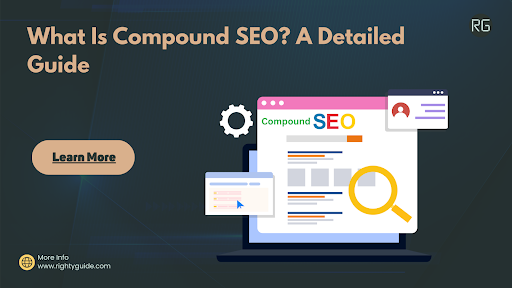
Imagine this scenario: You have invested countless hours creating exceptional blog posts, optimizing your website, and carefully selecting keywords. However, despite all your efforts, you find that your organic traffic remains stagnant and your rankings fail to improve. It can be quite frustrating, don’t you agree?
That’s where Compound SEO comes into play. It’s time to move beyond the basics and explore advanced strategies that can genuinely propel your website to the pinnacle of search engine result pages.
In this comprehensive guide, we will delve into the concept of Compound SEO and its potential to transform your online presence. Throughout our exploration, we will uncover the drawbacks associated with traditional SEO methods and introduce you to indispensable techniques capable of fostering exponential growth and long-term success.
I’ve got a wealth of insights, tips, and step-by-step instructions to offer you. From recognizing the power of user experience and the significance of quality content to harnessing advanced optimization strategies, I’ll provide a treasure trove of valuable information.
Understanding SEO Basics
SEO, an essential part of digital marketing, focuses on optimizing websites to improve their visibility and rankings in search engine results pages (SERPs). Understanding SEO basics is vital for establishing a solid online presence.
What is SEO?
SEO, at its core, refers to the practice of improving a website’s visibility on search engines like Google. The primary objective is to enhance relevance and authority, ultimately attracting more organic traffic without any payment.
Why is SEO Important?

SEO plays a vital role in driving organic traffic to websites. When a website achieves higher rankings in search engine result pages (SERPs), it gains more visibility, ultimately attracting increased potential visitors. This enhanced visibility can subsequently lead to improved conversion rates, heightened brand awareness, and enhanced online credibility.
“SEO is not just about search engines, but it’s also about understanding what makes your audience tick and delivering valuable content that meets their needs.” – John Lincoln, SEO Expert
Key Components of SEO
1: Keywords Research
Keywords and keyword research are essential for any website. When users search online, they enter specific words and phrases into search engines. Conducting effective keyword research helps determine which terms are relevant to your website and appeal to your target audience.
2: ON-Page Optimization
On-page optimization is a crucial aspect of improving a website’s pages. It involves enhancing meta tags, URLs, headings, and content to align with the target keywords.
3: Technical SEO
Technical SEO, an essential aspect of website optimization, primarily focuses on improving the technical elements of a website. These elements include enhancing site speed, ensuring mobile-friendliness, and optimizing crawlability. The ultimate objective is to enable search engines to easily access, comprehend, and index the website.
4: Link Building
One essential aspect of improving your website’s visibility is link building. This entails obtaining high-quality backlinks from reputable websites. By having these quality backlinks, search engines recognize your website as reliable, authoritative, and deserving of higher rankings.
Key Takeaway: Understanding the basics of SEO is crucial for anyone looking to establish a robust online presence. SEO involves optimizing websites to increase their visibility and rankings in search engine results pages. Key components of SEO include keywords and keyword research, on-page optimization.
Overview of Compound SEO
Compound SEO offers a comprehensive approach to search engine optimization. It combines various strategies and techniques for optimal results, going beyond traditional SEO practices. By incorporating elements of technical SEO, content optimization, and user experience, compound SEO enhances your website’s visibility and organic rankings.
In this section, we will delve into the key components of compound SEO and explore how they contribute to improving your online presence.
Why is Compound SEO Important?
Compound SEO is a comprehensive and long-term strategy for enhancing your website’s search engine visibility. It emphasizes the establishment of a strong foundation by effectively implementing all four elements of SEO: technical SEO, on-page SEO, off-page SEO, and content.
By harmonizing these components in a coordinated manner, Compound SEO maximizes its impact over time.
Benefits of Compound SEO?
Compound SEO holds significant importance as it aids in achieving sustainable, long-term growth for your website’s search engine rankings. By establishing a robust foundation for your SEO strategy, you can ensure that your website remains firmly positioned to rank well on search engines for an extended period of time.
Here are some of the benefits of compound SEO:
Sustainable Growth: Compound SEO offers a pathway to long-term, sustainable growth in your website’s search engine rankings. Unlike relying on quick fixes or short-term strategies, Compound SEO ensures lasting results and steady progress over time.
Long-Term Visibility: Compound SEO can greatly enhance your website’s long-term visibility in search engines. By implementing a solid foundation for your SEO strategies, you ensure that your website remains unaffected by any changes in search engine algorithms. This enduring approach guarantees sustained success and increased online presence over time.
“Compound SEO is about patience and perseverance. It takes time to see results, but it’s worth it in the long run.” – Danny Sullivan, Google Search Liaison
Reduced reliance on paid advertising: Reduced reliance on paid advertising can be achieved through Compound SEO. By attracting more organic traffic to your website through search engines, you can decrease your dependence on paid advertisements.
Improved brand reputation: Improving your brand reputation is essential, and Compound SEO can play a crucial role in achieving that. By enhancing the visibility and authority of your website in search engines, Compound SEO helps establish a positive perception of your brand. This increased visibility not only boosts
If you’re truly committed to enhancing your website’s search engine ranking, then embracing compound SEO is the way forward. It’s a steadfast and enduring approach that demands both patience and consistency.
However, it undeniably represents the most effective avenue toward sustaining growth and achieving long-term success.
Components of Compound SEO
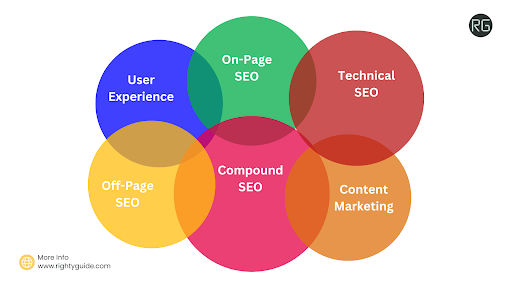
Technical SEO
Technical SEO serves as the backbone of Compound SEO. It plays the role of an unsung hero, ensuring the solidification of your website’s digital presence. This vital section focuses on optimizing various technical components to enhance both search engine and user experiences.
By fine-tuning your website’s engine for fast loading speeds, mobile friendliness, structured data, and security measures, Technical SEO becomes a driving force in boosting your site’s search engine exposure and providing a superior browsing experience to your audience. Ultimately, it forms the bedrock of effective SEO strategies that improve overall website performance and establish it as a digital powerhouse.
On-Page Optimization
On-page optimization is the creative force driving your digital content. This vital process involves crafting captivating, relevant, and user-friendly web pages that meet search engine algorithms while engaging your target audience. On-Page Optimization transforms your web pages into magnets through well-chosen keywords, compelling content, optimal meta tags, and organized headers.
On-Page Optimization seamlessly merges with Compound SEO to transform your website into a content powerhouse. Its primary focus lies in creating an immersive digital experience that not only improves rankings but also ensures visitors keep returning. The essence of On-Page Optimization lies in the heart and soul of your online presence, giving life to your content and assisting your brand in ascending the competitive digital marketplace.
Off-Page Optimization
Off-page optimization is a powerful force that extends your digital reach beyond your website. This crucial step enhances your website’s authority, credibility, and online reputation.
When it comes to Off-Page Optimization, several key elements come into play: link development, social signaling, and online reputation management. These factors contribute to creating a captivating digital presence that garners the support of respected websites. Ultimately, this endorsement enhances your site’s search
When Off-Page Optimization is seamlessly integrated with Compound SEO, it enhances website visibility and positions your company as a trustworthy and influential player in the market. By connecting your website to the digital world, Off-Page Optimization propels your online success.
User Experience
User experience is vital for successful compound SEO. Search engines give priority to websites that offer a seamless, intuitive, and satisfying user experience. Factors such as website design, navigation, load time, and mobile responsiveness all contribute to creating a positive user experience. By ensuring that your website is easy to use and navigate, you can increase engagement and improve search rankings.
Content Marketing
Content marketing plays a crucial role in enhancing compound SEO. By developing top-notch, pertinent, and captivating content, you can allure and retain your intended audience effectively. Moreover, compelling content has the innate ability to naturally draw backlinks, augmenting your website’s authority and credibility in the eyes of search engines.
Key Takeaway: Compound SEO is a comprehensive approach that integrates technical SEO, on-page optimization, user experience, and content marketing to improve search visibility and drive organic traffic.
How to implement Compound SEO
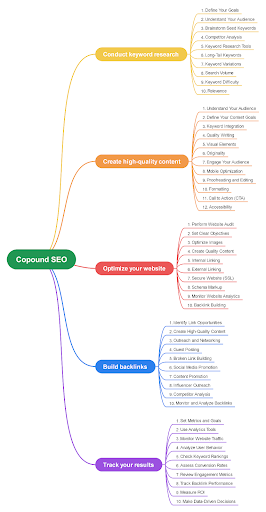
Implementing Compound SEO requires a well-structured approach.
Here’s a step-by-step guide:
Conduct keyword research
To start, it is important to identify the keywords and phrases that are relevant to your target audience’s search tendencies. Conducting thorough keyword research will aid in gaining insight into user intent and ensuring your content caters to their needs. Utilize tools such as Google Keyword Planner, SEMrush, or Ahrefs to pinpoint high-potential keywords and delve into their search volume and competitiveness.
Create high-quality content
Create content that both informs and engages your audience by incorporating the identified keywords. Ensure that your content adds value and addresses their questions effectively. Explore different formats, such as blog posts, infographics, videos, or podcasts, to cater to diverse preferences and enhance your overall content strategy.
Optimize your website for search engines
When working on improving your website’s performance, it is crucial to pay attention to technical SEO aspects. This includes focusing on elements like site speed, mobile optimization, and site structure. It is important to ensure that search engines can easily crawl and index your website for better visibility. Additionally, optimizing your website’s URL structure, improving meta tags, and using appropriate header tags (H1, H2, H3) are also part of technical SEO practices. These measures help signal the importance of different sections of your content.
Build backlinks
To improve your website’s authority, it is crucial to engage in ethical link-building practices. One effective approach is seeking opportunities to have reputable websites link to your content. There are several strategies you can employ to build backlinks, including guest posting, reaching out to industry influencers, and creating shareable content that naturally attracts links. By implementing these techniques, you can enhance your website’s credibility and boost its online presence.
Track your results
To monitor your website’s performance, make use of tools such as Google Analytics and Google Search Console. By keeping a close watch on your rankings, traffic, and user engagement, you can analyze the data to identify areas that need improvement. Adjust your strategy accordingly based on the insights gained. Regularly tracking your results will enable you to measure how effective your Compound SEO efforts are.
Key Takeaway: By implementing a comprehensive compound SEO strategy, businesses can enhance their online presence, improve organic visibility, and drive targeted traffic to their websites, ultimately leading to increased conversions and business growth.
Measuring the Success of Compound SEO
The success of Compound SEO can be measured through key performance indicators (KPIs) like:
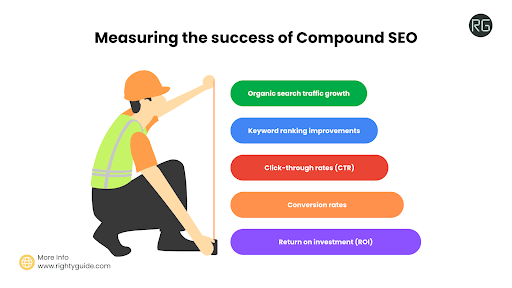
Organic search traffic growth: By consistently monitoring the rise in organic traffic to your website, you can gauge the effectiveness of your SEO strategy.
Keyword ranking improvements: Monitoring your target keywords’ rankings allows you to track how easily users can discover your content. When your relevant keywords achieve higher rankings means that your content is more discoverable by users.
Click-through rates (CTR): Analyze the click-through rate (CTR) of your web pages in search results. A high CTR indicates that your content is captivating and aligned with users’ queries.
Conversion rates: To gauge the effectiveness of your website, track the number of visitors who complete desired actions, such as signing up for a newsletter or making a purchase. An increase in conversion rates suggests that your content and website are compelling.
Return on investment (ROI): To better understand the value of your SEO strategy, you can calculate the return on investment (ROI) by comparing the implementation costs with the revenue generated from organic traffic. A positive ROI indicates how beneficial your SEO efforts are.
Common mistakes to avoid
While implementing Compound SEO, avoid these common pitfalls:
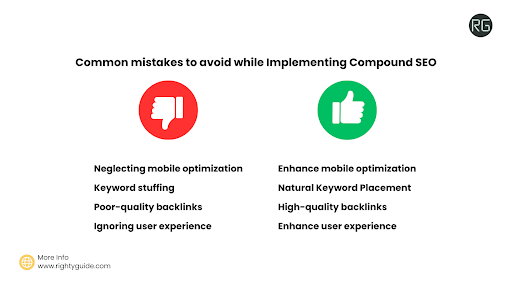
Neglecting mobile optimization: Neglecting mobile optimization could prove detrimental in today’s digital landscape. With the increasing prevalence of mobile devices, it has become imperative for a website to be mobile-responsive. Failure to prioritize mobile optimization can result in a subpar user experience and diminish search rankings.
Keyword stuffing: Keyword stuffing is detrimental to both your rankings and readability. To improve your content, prioritize natural keyword placement while delivering valuable information.
Poor-quality backlinks: Be cautious of the quality of the backlinks you acquire. Low-quality or spammy backlinks can result in penalties from search engines. Instead focuses on obtaining high-quality and relevant backlinks from authoritative sources.
Ignoring user experience: Neglecting the user experience is detrimental to your SEO strategy. If your website has a poor design, slow loading times, or confusing navigation, it will not only frustrate users but also have a negative effect on your search engine rankings.
Falling behind on algorithm changes can be detrimental to your search engine rankings. It’s crucial to stay updated on the latest updates and adjust your strategies accordingly in order to maintain and improve your position.
Emerging Trends in Compound SEO
Voice Search Optimization
Voice search is gaining popularity as voice-activated devices, such as smartphones and smart speakers, continue to rise. It is crucial to optimize your content for voice search queries. Consider including conversational keywords and providing answers to common voice search questions within your content.
Mobile-First Indexing
Google has made a significant shift towards mobile-first indexing. This means that when ranking and indexing websites, Google now primarily relies on their mobile versions. It is no longer an option but a necessity for SEO success to ensure that your website is mobile-friendly.
Video SEO
Video content is becoming increasingly prominent. When you create engaging and informative videos, it can greatly enhance your SEO efforts. Remember to optimize video titles, descriptions, and tags while also considering transcribing videos for better accessibility to search engines.
Featured Snippets and Structured Data
Featured snippets are concise answers to user queries that appear at the top of search results. By using structured data markup, you can help search engines better understand your content and increase the likelihood of being featured in a snippet. Implementing structured data can enhance your visibility and boost click-through rates.
E-E-A-T (Experience, Expertise, Authoritativeness, Trustworthiness)
When evaluating web content, Google places a strong emphasis on experience, expertise, authoritativeness, and trustworthiness (E-E-A-T). To demonstrate these qualities effectively, it is advisable to showcase author bios, credentials, and credible sources within your content. Additionally, customer reviews and testimonials can greatly enhance the trustworthiness of your website.
The Role of Social Media in Compound SEO
Social media and SEO share a significant relationship. Although social signals like likes, shares, and comments do not directly influence rankings, they can have an indirect impact on SEO. In fact, social media can augment your efforts for Compound SEO. Let’s explore how:
Brand Exposure
Social media platforms present an excellent opportunity to enhance brand exposure. By sharing your content on these platforms, you can increase visibility and drive more traffic to your website.
Backlinks
Engaging content shared on social media can attract backlinks from other websites. High-quality backlinks from social shares can positively influence your search engine rankings.
Influencer Marketing
When working with influencers in your industry, their collaboration can greatly enhance the reach of your content. By leveraging their influence, you can effectively promote your content to a wider audience, resulting in increased website traffic and social engagement.
Social Signals
Social signals, such as likes, shares, and comments, can suggest the popularity and relevance of your content. Although they don’t directly impact rankings, search engines often take notice of highly engaged pieces. This attention can result in increased visibility for your content.
Data Analytics for Compound SEO Success
Data analytics plays a crucial role in any SEO strategy. By examining data, you can uncover valuable insights into user behavior, content performance, and areas that require improvement. Let’s explore some effective ways to harness data analytics for achieving Compound SEO success.
Google Analytics
Google Analytics offers a wealth of valuable insights into the performance of your website. You can track user traffic, analyze behavior patterns, and measure conversion rates. This data is instrumental in identifying pages that are performing well and areas where optimization is needed to enhance overall user experience.
Keyword Performance
Monitor the effectiveness of your chosen keywords by tracking their performance. Analyze which keywords are generating traffic and leading to conversions. Use this data to make informed decisions about your content strategy and make necessary adjustments as needed.
User Engagement Metrics
To gauge user engagement, monitor metrics such as bounce rate, time on page, and click-through rate. A high level of engagement suggests that your content is effectively connecting with your audience.
A/B Testing
Conduct A/B tests to optimize various elements of my website. These elements include headlines, calls to action, and page layouts. By analyzing the data from these tests, You will be able to make informed decisions that improve user experience and conversion rates.
The Role of Content Marketing in Compound SEO
Content marketing forms the foundation of Compound SEO. It is through the creation and promotion of high-quality, valuable content that you can attract and engage users on your website. To further enhance your Compound SEO efforts, consider implementing these proven content marketing strategies:
Content Calendar
To effectively plan and organize your content strategy, it is recommended to create a content calendar. This calendar serves as a structured guide, ensuring that you consistently publish content that covers various topics relevant to your target audience.
Long-Form Content
Long-form content, which refers to articles exceeding 2000 words, tends to achieve favorable results in search rankings. This format allows for a comprehensive exploration of topics while showcasing expertise. It is important, however, to maintain engagement and provide valuable information in long-form content.
Evergreen Content
Evergreen content refers to valuable and relevant content that maintains its significance over an extended period. By creating evergreen pieces, you ensure consistent traffic to your website long after they have been published.
Guest Blogging
To expand your reach and gain valuable backlinks, consider guest blogging on reputable websites within your industry. Make sure your guest posts provide insightful and relevant content that resonates with the host website’s audience.
The Future of Compound SEO: AI and Machine Learning
The future of SEO is closely intertwined with advancements in artificial intelligence (AI) and machine learning. Search engines, especially Google, are increasingly employing AI to grasp user intent and provide more personalized search results. Let me illustrate how AI and machine learning are shaping the prospects of SEO:
Predictive Search
AI-powered predictive search engines have the ability to anticipate user queries and provide results even before users complete their typing. By optimizing content for predictive search, businesses can significantly enhance their visibility in online searches.
Natural Language Processing (NLP)
NLP technology enables search engines to comprehend the context and intended meaning behind search queries. By optimizing for natural language and conversational queries, websites can improve their SEO rankings.
Personalization
By analyzing user behavior and preferences, machine learning algorithms are able to provide personalized search results. This personalized content delivery based on individual user preferences has the potential to become a major SEO strategy.
Voice Search
Voice search depends on artificial intelligence and natural language processing. It is crucial to optimize your content for voice search queries, especially as more users embrace voice-activated devices.
Conclusion
Compound SEO encompasses various techniques, including technical optimization, on-page, and off-page strategies, as well as content optimization. This multifaceted approach forms a robust SEO strategy that can significantly enhance online visibility for businesses.
“Compound SEO is about building a solid foundation for your website’s search engine visibility over time.” – Neil Patel, co-founder of Quicksprout
By comprehending its individual components and effectively implementing them, businesses can attract more organic traffic and achieve success in the digital landscape. It is important to note that Compound SEO requires continuous monitoring, adaptation, and innovation. It is an ongoing process rather than a one-time effort.
This ensures that businesses stay ahead in the ever-competitive online marketplace. An ongoing process that requires continuous monitoring, adaptation, and innovation to stay ahead in the ever-competitive online marketplace.
